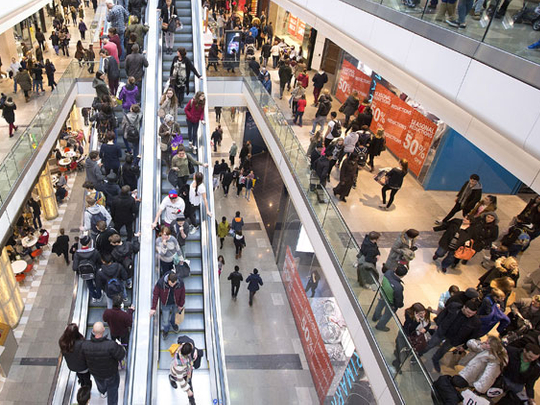
LONDON: British shoppers kept a tight grip on their wallets last month as retail sales grew at their slowest annual pace since April 2018 amid uncertainty about Brexit and December’s election.
Thursday’s figures from the Office for National Statistics were collected before Black Friday sales promotions, but the ONS said it was confident the slowdown in year-on-year sales growth to 1.0% in November from October’s 3.1% was not distorted by the timing.
Economists polled by Reuters had expected a smaller slowdown in growth, to 2.1%.
Spending by shoppers had been supporting the overall economy for most of the time since 2016’s Brexit referendum; Thursday’s figures added to other signs of a slowdown in the run-up to last week’s election.
Excluding fuel purchases, retail sales growth was the weakest since October 2017.
Retail sales in November were down 0.6% from October, and have now failed to show any monthly growth for four months in a row — the longest such run since at least 1996.
“All main sectors saw their sales fall with the exception of food stores,” ONS statistician Rhian Murphy said.
Sterling fell briefly on the data, but most analysts are more focused on the political outlook.
Prime Minister Boris Johnson’s sweeping election victory has eliminated the risk of a disruptive no-deal Brexit on Jan. 31, removing some of the uncertainty hanging over the British economy.
But a hit to trade remains possible at the end of 2020, when Johnson insists a post-Brexit transition period will end, regardless of whether or not he can negotiate a trade deal with the European Union before then.
This year, the November retail sales sample period did not include sales promotions in the days running up to Black Friday, which fell on Nov. 29, but the ONS said it was confident its seasonal adjustment process accounted for this.
A fuller picture will be available once November’s sales can be compared with December data.
“At face value, November’s further drop in retail sales is pretty concerning,” said Thomas Pugh, UK economist at consultancy Capital Economics.
But he doubted whether the ONS methodology fully captured the effect of Black Friday not being included in November’s data, and predicted a pick-up in December.
“Even so, given the falls in October and November, it will be very difficult for retail sales volumes to grow at all in Q4 as a whole. So not a very merry Christmas for retailers.”
November figures from the British Retail Consortium — which also did not cover the Black Friday period this year — indicated that shoppers spent 4.4% less than in November 2018, though the BRC said the underlying trend was more positive.
The ONS figures come too late to influence the Bank of England’s December interest rate decision, which is due for publication at 1200 GMT.
The BoE is expected to keep rates steady at 0.75%, but economists expect two policymakers — Michael Saunders and Jonathan Haskel — to vote again for a cut because of tentative signs of weakness in the job market.












